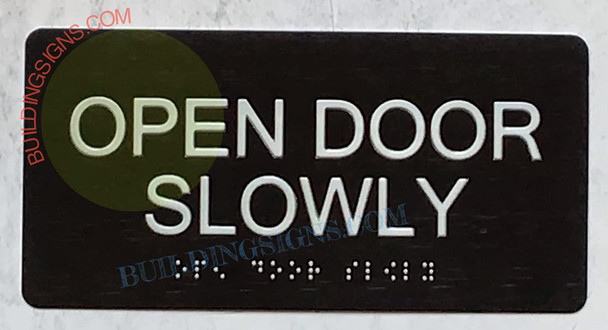BUILDINGSIGNS.COM
OPEN DOOR SLOWLY SIGN Tactile Touch Braille Sign (Aluminum !!,black, Size 4x8)- The Sensation line
- SKU:
- B0BSV9PWWB
- UPC:
- 736816240681
- Availability:
- Usually Ship Within 2 days
Description
About this item
RE-ENTRY ALL FLOORS SIGN
RAISED LETTERS RAISED BRAILLE STRONG CONTRAST ALUMINIUM SIGN (NOT A PLASTIC ) RUST FREE, COMMERCIAL USE,COMES WITH DOUBLE SIDED TAPE- EASY INSTALLTION, DESIGNED TO LAST,SIZE 4X8 INCH
The Importance of Having an "Open Door Slowly" Braille Sign in a Building
In the realm of accessibility and inclusive design, Braille signage serves a pivotal role in ensuring that public spaces are navigable and safe for all individuals, including those who are blind or have low vision. Among the various types of Braille signage that contribute to accessibility, the "Open Door Slowly" Braille sign holds particular importance due to its role in promoting safety, awareness, and equal access within buildings.
Enhancing Safety and Awareness
Opening doors can pose potential hazards, especially in public buildings with heavy foot traffic. For individuals who are blind or have low vision, not being aware of a door opening suddenly can lead to accidents or discomfort. A Braille sign that indicates "Open Door Slowly" provides essential information, alerting everyone to proceed with caution when entering or exiting through a door. This simple yet crucial message helps prevent collisions, injuries, and ensures a smoother flow of movement within the building.
Legal Compliance and Ethical Responsibility
From a legal standpoint, many jurisdictions have established accessibility standards that mandate the inclusion of Braille signage in public buildings. These standards are designed to ensure equal access and safety for individuals with disabilities, including those who are visually impaired. Installing an "Open Door Slowly" Braille sign not only helps buildings comply with these regulations but also reflects a commitment to ethical responsibility and respect for the rights of all individuals to navigate public spaces safely and independently.
Promoting Independence and Dignity
Independence and dignity are fundamental rights that Braille signage, such as an "Open Door Slowly" sign, helps uphold for individuals with visual impairments. By providing clear and accessible information about door operations, buildings empower individuals to navigate their surroundings with confidence and autonomy. This promotes a sense of dignity and reduces dependency on assistance, thereby fostering a more inclusive environment where everyone can participate equally in daily activities.
Educational Role and Community Awareness
Beyond its practical benefits, the presence of an "Open Door Slowly" Braille sign plays an educational role in raising awareness about accessibility issues among building occupants. It encourages all users, whether visually impaired or not, to be mindful of safety considerations and to consider the needs of others in shared spaces. This fosters a culture of empathy, understanding, and proactive behavior towards ensuring the comfort and safety of all individuals within the building community.
Symbol of Inclusivity and Care
Installing an "Open Door Slowly" Braille sign goes beyond meeting legal requirements; it symbolizes a commitment to inclusivity, safety, and care for all building users. It communicates that the building management values the well-being and participation of every individual, regardless of their abilities. Inclusive practices, such as providing Braille signage, contribute to a welcoming and supportive environment where barriers to accessibility are minimized, and everyone can feel respected and valued.
Conclusion
In conclusion, the installation of an "Open Door Slowly" Braille sign in a building is essential for promoting safety, awareness, and equal access for individuals who are blind or have low vision. By providing clear instructions about door operations in a format accessible to everyone, building owners and administrators enhance the overall accessibility and inclusivity of the environment. As we continue to strive towards creating more accessible public spaces, the presence of Braille signage, including "Open Door Slowly" signs, represents a significant step in ensuring that safety and independence are prioritized for all individuals within the building community.
DISCLAIMER to comply with the New York City Consumer Protection Law which applies to all businesses operating in New York City: We are small family-owned and family-operated Brooklyn-based business. We are not a City of New York store nor are the website, products or services affiliated with the City of New York or any agency of the City of New York. We ourselves, our business, websites, products, services, or any hyperlinks from its website are not sponsored by, approved by, affiliated with, endorsed by, or connected to the City of New York or any agency of the City of New York, including but not limited to HPD, DOB, DOT, DSNY, FDNY and federal directly or by implication. DISCLAIMER These codes may not be the most recent version. The State / federal or other regulation department may have more current or accurate information. We make no warranties or guarantees about the accuracy, completeness, or adequacy of the information contained on this site or the information linked to on the state site. Please check official sources. The requirements for sign content are determined by intended use and by applicable regulation. The BUYER is responsible for determining the appropriate content for a sign or package of signs. WE make no warranty or representation of suitability of a sign for any specific application. IT IS THE CUSTOMER'S RESPONSIBILITY TO ENSURE THAT THE SIGNS THE CUSTOMER ORDERS ARE IN COMPLIANCE WITH ALL STATE, FEDERAL, LOCAL, AND MUNICIPAL LAWS. Please review terms and conditions prior to purchase. For more information about what is required, see the laws that are referenced and the rules applicable to your city and state. This page is for informational purposes only and is not intended as legal advice, professional advice or a statement of law. You may wish to consult with an attorney.
















